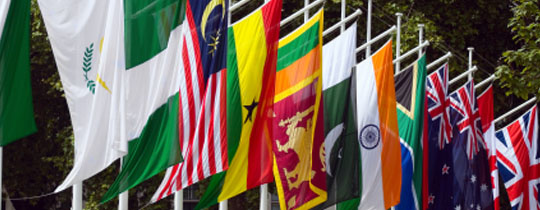13th March 2017 London, UK
The Commonwealth is no Empire

When the recently elected Gambian President announced that he intended to take his country back into the Commonwealth (the previous president had withdrawn Gambia from the organisation), one of my twitter followers commented that Gambia was becoming a British colony again!
For some in Turkey, the sun has never set on the British Empire. But it has. Well and truly.
Our imperial past, like that of all empires, is a troubled one. It involved cruelty and exploitation. As a Briton of Irish heritage you’d expect me to recognise that.
But out of empire grew strong bonds between countries. And those bonds find their greatest representation in The Commonwealth which celebrated its 68th birthday on 13th March. The Commonwealth Heads of Mission in Turkey, along with some Turkish guests, got together to celebrate The Commonwealth of Nations or The Commonwealth as it is now more often named. It is definitely not The British Commonwealth as Turkish dictionaries would have it!
So what is The Commonwealth? Is it an exclusive club for countries that play cricket? No… although many of us do play that most unfathomable of games. Is it for countries that were former colonies of Britain. Yes, or at least that’s how it started, as countries under the British Empire gained independence they joined The Commonwealth. But others can join. The last two members to join, Rwanda and Mozambique were never UK colonies. Most importantly, the Commonwealth aims to bring together countries with a close historical link under a common umbrella based on shared values of freedom, justice and democracy, with the aim of working together to tackle global challenges.
The Commonwealth is one of the world’s oldest political associations of states. Formed in 1949 the term The Commonwealth reflects the growing and diverse nature of the organisation. Today 52 states are members of the Commonwealth spanning six continents – Africa, Asia, the Americas, Europe and the Pacific. Together we make up a quarter of the world’s land mass. That’s about 2.4 billion people or one third of the world’s population. Membership is based on free and equal voluntary co-operation.
We are diverse. Our member countries are amongst the world’s largest, smallest, richest and poorest countries. Some countries have populations of 1.5 million people or less; India has a population of 1.5 billion. But they all share one important thing in common. All members subscribe to the Commonwealth’s values and principles outlined in the Commonwealth Charter – democracy, human rights and the rule of law. And all the leaders of the member countries have an equal say in shaping Commonwealth policies and priorities, regardless of the size or economic stature of their country.
So whilst Her Majesty Queen Elizabeth is currently the Head of the Commonwealth – a role which involves a number of symbolic functions – the actual decisions regarding the functioning and priorities of the Commonwealth are made collectively by member states through a well established secretariat.
We believe that it is a unique organisation with a network that can deliver on global issues like no other. Every two years, the member states meet to discuss issues affecting the Commonwealth and the wider world at the Commonwealth Heads of Government Meeting (CHOGM). The UK will be hosting the Commonwealth Summit in 2018. This will be an opportunity to set a new vision for a strong and effective Commonwealth.
This year’s theme for Commonwealth Day is “A Peace-Building Commonwealth”. The current Secretary General, Baroness Patricia Scotland (the first woman to hold the post) has said: “At a time of increasing instability and uncertainty in the world, the Commonwealth family of nations in its rich diversity becomes an ever more-needed source of strength and hope for all its members.”
Historically, the Commonwealth represents a group of countries that share a close bond with the UK. Generations of people from Commonwealth countries have chosen to make the UK their home, bringing with them diversity, incredible talent and a rich cultural heritage that defines the UK’s identity today. I see this diversity across the UK in so many different walks of life – music, food, fashion, arts, entertainment – and in my own organisation the Foreign and Commonwealth Office. Indeed my own diplomatic staff includes people who can trace their heritage to Canada, Nigeria, Australia, New Zealand and Pakistan (and I’m bound to have forgotten some!).
Of course, that Commonwealth identity undeniably has its roots in Empire. But it is an identity that has long outgrown that imperial past. It is about our common values of justice, the rule of law and democracy and equal partnerships in society and the economy. In short, it is about common wealth for all. Happy Commonwealth Day!